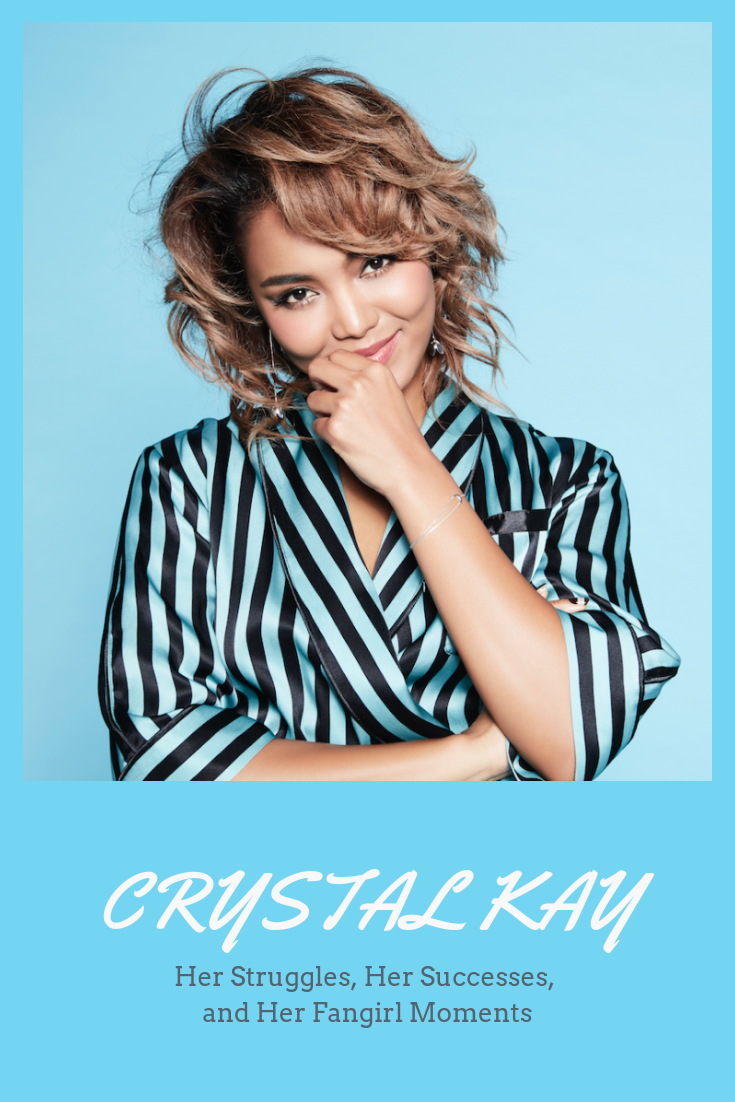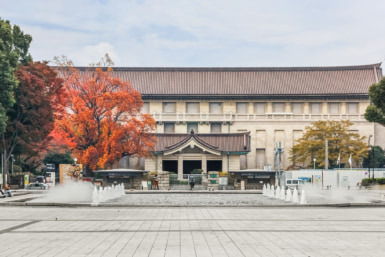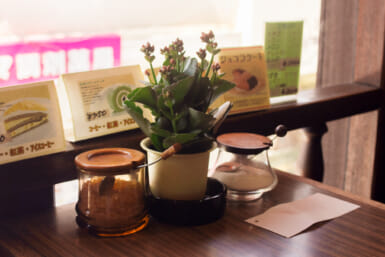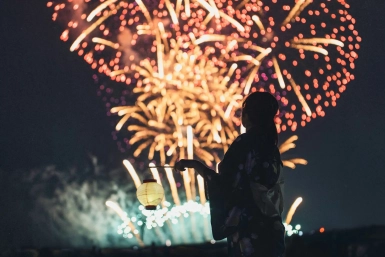TW interviews the singer on struggling with cultural identity, celebrating two decades in the industry, and her new album which is set for release this month.

Seen as a pioneer for mixed-race artists in Japan, Crystal Kay burst on to the music scene as a 13-year-old in 1999. Born to a Korean mother and African-American father, she made a name for herself with a look and sound that was different from the domestic pop acts dominating the charts at the time.
Almost two decades and nine top-10 albums (including compilations) later and she’s still going strong, with her latest album, For You, set to be released this month. The Yokohama-born singer recently sat down with TW to speak about the new record, her career to date, and the difficulties she’s faced as a Korean-American entertainer in Japan. We began by asking about her upbringing.
“As a child I was constantly surrounded by music,” recalls Kay. “My parents were both musicians, and Mom was on the verge of a record deal before having me. They listened to all kinds of songs at home, and often took me to concerts. I even got to meet Diana Ross and Bobby Brown.”
“From the age of four I started to do commercial jingles for a friend of my Mom who ran a production company,” adds Kay. “That went on until my early teens when one of the jingles was expanded for the single ‘Eternal Memories’.”
“I couldn’t make friends and was kind of bullied. It was just things like ‘you’re black’ and ‘your hair’s strange’”
During that period, Kay went to school at the military base in Yokosuka. It was a comfortable environment for the youngster as she was surrounded by children from a similar background. She felt like a normal kid there, however believes that wouldn’t have been the case had she gone to a Japanese school. “I remember going to a summer camp and that sucked,” says the singer. “I couldn’t make friends and was kind of bullied. It was just things like ‘you’re black’ and ‘your hair’s strange,’ so I wasn’t depressed by it or anything, but I’d be lying if I said it didn’t bother me.”
As Kay’s career started to take off, her cultural identity became more of an issue and that was something she struggled with internally.
“Of course, it can be advantageous to be ‘unique’ in the music industry, but I never saw it that way,” she says. “It felt more like people couldn’t relate to me. Japan’s a largely homogenous country and I was nothing like the performers they were used to. There were negative comments online; I was called the N-word, and derogatory things were said about my Korean heritage. Being a sensitive soul, it did get to me.”
“As you get older you realize you’ve got to go your own way, and if people still say [racist] things that’s their problem,” continues Kay. “I feel there’s more acceptance now and a growing sense that it’s cool to be multi-cultural and multilingual in Japan. Having so many positive role models in various industries has certainly helped. You’ve now got [mixed-race] actors thriving Hollywood, and sports stars such as [tennis player] Naomi Osaka and [sprinter] Sani Brown doing well. There are also many biracial musicians. It’s inspiring for younger generations.”
An influential figure herself, Kay was one of the first half-black, half-Asian entertainers to make a big impression here, helping to pave the way for singers like Thelma Aoyama and enka star Jero. By the time she was 21, Kay had four top-five albums, including the chart-topping record All Yours. She hasn’t managed to hit those heights again over the past decade and has gone through some tough times yet feels this has helped her grow as an artist.
“I was questioning where my life was going when everyone else seemed to be on the right path”
“I had something that felt like a quarter-life crisis around the age of 25, and then another one three years later,” says Kay with a smile. “I think most people go through it, especially women. Though I’ve never considered changing careers, I was questioning where my life was going when everyone else seemed to be on the right path. It’s tough, but you find your way and these difficulties can be a catalyst for good music. That said, my songs are usually positive and uplifting.”
According to Kay, her new album is a mix of her favorite genres including R&B, J-pop and future bass. A total of 10 tracks includes the singles “Sakura” and latest release “Shiawasette,” the theme tune for NHK drama Daisy Luck. There’s also a Japanese version of Alphaville’s signature track “Forever Young.”
“There are some bangers, mid-tempo tracks and a ballad,” says Kay. “I don’t like a flat vibe so it’s good to balance it out. “Shiawasette” has been well-received, “Forever Young” is always popular at live shows, and I think there are some standout future bass tracks on there. I’m very happy with the sound.”
Looking further ahead, Kay is already preparing for July 1, 2019, the date that marks her 20th anniversary in the music industry. “There will be lots going on and we’re starting our buildup to that point with this new record,” she says enthusiastically. “Nineteen years is a long time and I’m proud to have kept going this long, but there’s still plenty more to come.”
Crystal Kay On …
Performing at the Royal Albert Hall …
“I was asked to sing ‘All Eyes on Me,’ Final Fantasy VIII’s theme tune, for the game’s 25th anniversary album and tour including shows in Japan and London’s Royal Albert Hall. To sing such a popular song at one of the world’s most iconic venues was incredibly nerve-wracking, and I wasn’t sure if the Final Fantasy family would accept my version. They ended up giving me a standing ovation which was one of my career highlights to date.”
Her duet with Lionel Richie …
“This was another highlight. It was for the Japanese version of Lionel Richie’s Tuskegee album. We recorded [“Endless Love”] separately, but I then flew out to his house in Beverly Hills, where he has his own studio, to make the video. Lionel’s such a pro and so good at making you feel relaxed. We keep in contact via WhatsApp and he sends me funny memes and things. I love him.”
Interviewing Janet Jackson and Alicia Keys …
“I almost peed myself for both [laughs], but Janet was probably more terrifying as she was always a huge idol of mine. I was prepped before; don’t ask this or mention that, but in the end, I didn’t need to say much because she just talked, which was great. Alicia was also amazing. She’s an inspiring and humble person who wants to help people. I’d love to have had more time with her. ”
Her musical influences …
“The music I listen to is varied and depends on my mood. Right now, I’m quite into future bass, people like [Dutch DJ] San Holo. Growing up I loved Beyoncé, Quincy Jones, Janet Jackson, and of course Michael [Jackson]. His music had a significant impact on me. My favorite tune is probably ‘Human Nature.’ It’s soft and embracing with deep lyrics. I just wish I could have met him.”
Her mother …
“Once I started professionally, Mom became my best critic. As a child it was hard to take at times, but I really appreciate it now. You don’t get that honest criticism from people in the industry. If something is terrible she’ll let me know right away, and that’s important to hear. She’s such a strong lady who was initially shut out by her strict Korean family after having me. Both she and my dad, who now lives in America, have supported me throughout my career.”
Her favorite cities …
“I love traveling, though don’t do it enough. I’m particularly interested in the old buildings of Europe. Mallorca was the place I enjoyed most. I had an amazing time there. In Japan, I’m biased, but the number-one city has to be Yokohama. It’s big and exciting yet has a laid-back, family-friendly vibe to it, unlike Tokyo. There’s a nice mix of Western and Eastern cultures, plus some wonderful places to eat, especially Shatenki in Chinatown.”
For more information or to buy Crystal Kay’s new album go to www.universal-music.co.jp/crystal-kay
This article originally appeared in the June 2018 issue of Tokyo Weekender magazine. Read the digital version here.
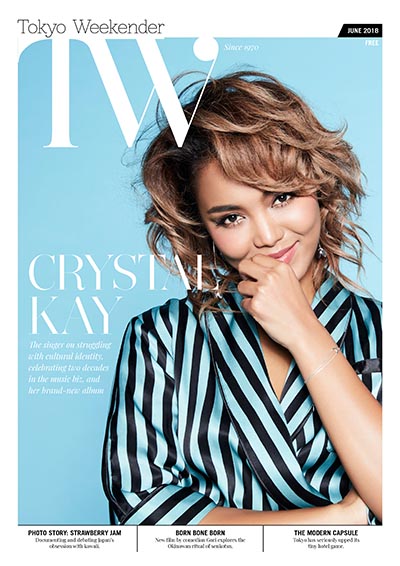
Updated On April 26, 2021


